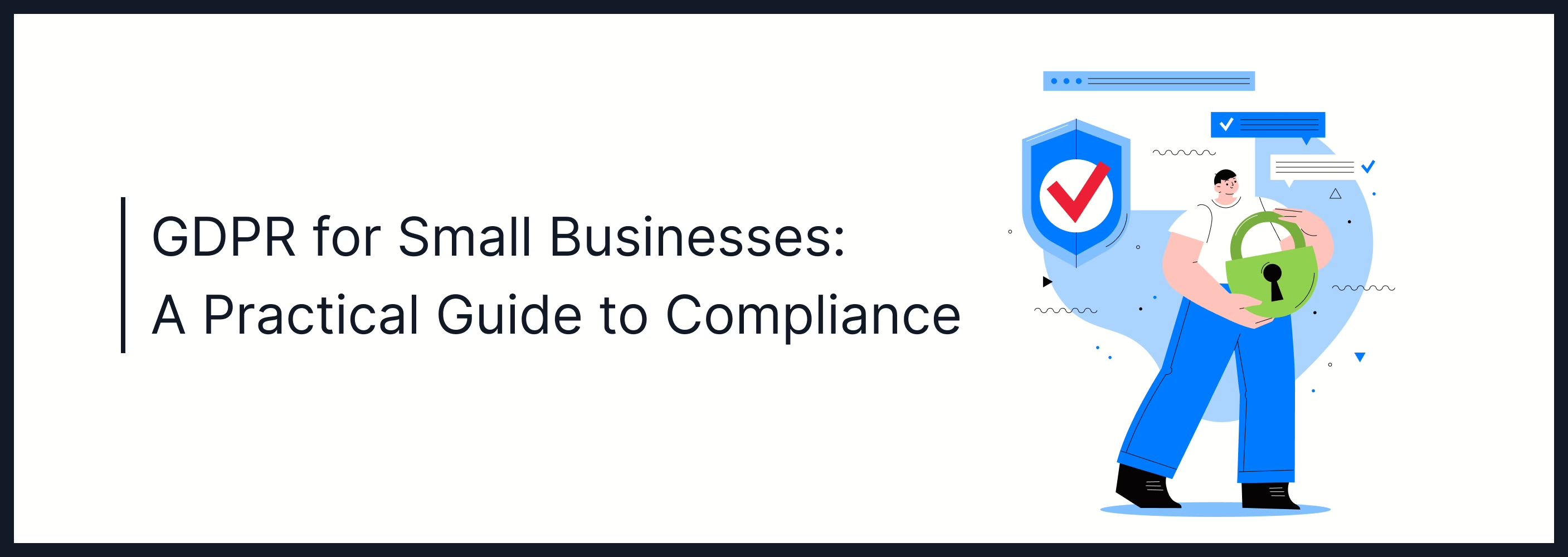
Oct 15, 2024 Information hub
GDPR for Small Businesses: A Practical Guide to Compliance
In today’s digital age, data privacy has become a critical concern for businesses of all sizes. The General Data Protection Regulation (GDPR), which came into effect on May 25, 2018, is one of the most significant data privacy laws in the world. While large corporations often have dedicated legal and compliance teams to handle GDPR requirements, small companies may find it more challenging to navigate the complexities of this regulation. However, compliance is not optional, and failure to adhere to GDPR can result in hefty fines and reputational damage.
This blog post aims to provide a comprehensive guide to GDPR for small companies, explaining its relevance, challenges, and practical steps for compliance. Whether you’re a startup or a small business owner, understanding GDPR is crucial for protecting your customers’ data and ensuring your business operates within the law.
What is GDPR?
Key Principles of GDPR
GDPR is built on several key principles that guide how businesses should handle personal data:
- Lawfulness, Fairness, and Transparency: Data must be processed lawfully, fairly, and in a transparent manner.
- Purpose Limitation: Data should only be collected for specified, explicit, and legitimate purposes.
- Data Minimization: Only the data necessary for the intended purpose should be collected.
- Accuracy: Personal data must be accurate and kept up to date.
- Storage Limitation: Data should not be stored for longer than necessary.
- Integrity and Confidentiality: Data must be processed securely to protect against unauthorized access or breaches.
Why GDPR is Relevant for Small Companies
Global Reach of GDPR
One of the most important aspects of GDPR is its extraterritorial scope. Even if your small company is based outside the EU, you are still required to comply with GDPR if you process the personal data of EU citizens. This means that a small e-commerce business in the United States, for example, must adhere to GDPR if it sells products to customers in Europe.
Data as a Valuable Asset
In the digital economy, data is one of the most valuable assets a company can possess. Small companies often collect personal data through websites, email marketing, customer relationship management (CRM) systems, and social media platforms. GDPR ensures that businesses handle this data responsibly, protecting individuals’ privacy and building trust with customers.
Avoiding Fines and Penalties
Non-compliance with GDPR can result in severe financial penalties. The regulation allows for fines of up to €20 million or 4% of a company’s global annual turnover, whichever is higher. For small companies, such fines could be devastating. Therefore, understanding and implementing GDPR is not just a legal obligation but also a financial safeguard.
Key GDPR Requirements for Small Companies
1. Appointing a Data Protection Officer (DPO)
Under GDPR, some companies are required to appoint a Data Protection Officer (DPO). While this is typically mandatory for larger organizations or those that process large amounts of sensitive data, small companies may also need to appoint a DPO if they engage in regular and systematic monitoring of individuals or process special categories of data (e.g., health data, racial or ethnic origin).
For small companies that do not need a full-time DPO, outsourcing this role to a third-party consultant is a viable option.
2. Data Mapping and Inventory
One of the first steps toward GDPR compliance is conducting a data mapping exercise. This involves identifying what personal data your company collects, where it is stored, how it is processed, and who has access to it. For small companies, this process may seem daunting, but it is essential for understanding your data flows and ensuring compliance.
Practical Steps for Data Mapping:
- List all the types of personal data you collect (e.g., names, email addresses, payment information).
- Identify the sources of this data (e.g., website forms, customer emails).
- Determine where the data is stored (e.g., cloud storage, local servers).
- Identify who has access to the data (e.g., employees, third-party vendors).
3. Obtaining Consent
GDPR places a strong emphasis on obtaining explicit consent from individuals before collecting or processing their personal data. Consent must be freely given, specific, informed, and unambiguous. For small companies, this means updating privacy policies and ensuring that any forms or pop-ups used to collect data include clear consent mechanisms.
Example of a GDPR-Compliant Consent Form:
- A checkbox that is not pre-ticked.
- A clear explanation of what the data will be used for.
- A link to the company’s privacy policy.
- The option to withdraw consent at any time.
4. Data Subject Rights
GDPR grants individuals several rights regarding their personal data, and small companies must be prepared to respond to these requests. These rights include:
- Right to Access: Individuals can request access to their personal data.
- Right to Rectification: Individuals can request corrections to inaccurate data.
- Right to Erasure (Right to be Forgotten): Individuals can request the deletion of their data.
- Right to Data Portability: Individuals can request their data in a structured, machine-readable format.
- Right to Object: Individuals can object to the processing of their data for certain purposes, such as marketing.
Small companies should establish procedures for handling these requests and ensure they can respond within the required timeframes (typically one month).
5. Data Breach Notification
GDPR requires companies to report certain types of data breaches to the relevant supervisory authority within 72 hours of becoming aware of the breach. If the breach poses a high risk to the rights and freedoms of individuals, the company must also notify the affected individuals.
For small companies, this means having a data breach response plan in place. This plan should include steps for identifying, containing, and reporting breaches, as well as notifying affected individuals if necessary.
Challenges Small Companies Face with GDPR Compliance
1. Limited Resources
One of the biggest challenges for small companies is the lack of resources—both financial and human—to dedicate to GDPR compliance. Unlike large corporations, small businesses may not have the budget to hire a full-time DPO or invest in expensive compliance software.
2. Complexity of the Regulation
GDPR is a complex regulation with many nuances, and small companies may struggle to understand all the requirements. For example, determining whether a company needs to appoint a DPO or how to handle cross-border data transfers can be confusing without legal expertise.
3. Third-Party Vendors
Many small companies rely on third-party vendors for services such as cloud storage, email marketing, and payment processing. Under GDPR, companies are responsible for ensuring that their vendors also comply with the regulation. This means conducting due diligence and ensuring that contracts with vendors include GDPR-compliant data processing agreements.
Solutions and Best Practices for GDPR Compliance
1. Leverage Free or Low-Cost Tools
There are several free or low-cost tools available that can help small companies with GDPR compliance. For example, some cloud storage providers offer built-in GDPR compliance features, such as encryption and access controls. Additionally, there are free templates available for privacy policies, consent forms, and data processing agreements.
2. Outsource Compliance Tasks
If your small company lacks the internal resources to handle GDPR compliance, consider outsourcing certain tasks to third-party experts. For example, you can hire a freelance DPO or work with a legal consultant who specializes in data privacy.
3. Regularly Review and Update Policies
GDPR compliance is not a one-time task; it requires ongoing effort. Small companies should regularly review and update their privacy policies, consent mechanisms, and data processing practices to ensure they remain compliant with the latest regulations and best practices.
Current Trends and Future Developments in GDPR
1. Increased Enforcement
Since GDPR came into effect, there has been a steady increase in enforcement actions. According to a report by DLA Piper, GDPR fines increased by 40% in 2021, with over €1 billion in fines issued. This trend is expected to continue as regulators become more proactive in enforcing the regulation.
2. Evolving Data Privacy Laws
GDPR has set the standard for data privacy laws worldwide, and many countries are now adopting similar regulations. For example, the California Consumer Privacy Act (CCPA) in the United States shares many similarities with GDPR. Small companies that operate internationally should be aware of these evolving laws and ensure they comply with all relevant regulations.
3. Focus on Data Ethics
Beyond legal compliance, there is a growing focus on data ethics. Consumers are becoming more aware of how their data is used, and companies that prioritize ethical data practices are likely to gain a competitive advantage. For small companies, this means going beyond the minimum legal requirements and adopting a customer-centric approach to data privacy.
Conclusion
GDPR compliance is essential for small companies that handle personal data, especially if they operate in or serve customers in the European Union. While the regulation may seem daunting, understanding its key principles and implementing practical steps can help small businesses avoid fines and build trust with their customers.
Key Takeaways:
- Understand the scope of GDPR: Even if your company is based outside the EU, you may still need to comply with GDPR if you process the personal data of EU citizens.
- Conduct a data mapping exercise: Identify what personal data you collect, where it is stored, and who has access to it.
- Obtain explicit consent: Ensure that you have clear and transparent consent mechanisms in place for collecting personal data.
- Prepare for data subject requests: Be ready to respond to requests for access, rectification, and deletion of personal data.
- Have a data breach response plan: Ensure you can quickly identify, contain, and report data breaches.
By taking these steps, small companies can not only comply with GDPR but also demonstrate their commitment to protecting customer privacy, which is increasingly important in today’s data-driven world.
By following this guide, small companies can navigate the complexities of GDPR and ensure they are well-positioned to thrive in a privacy-conscious business environment.
